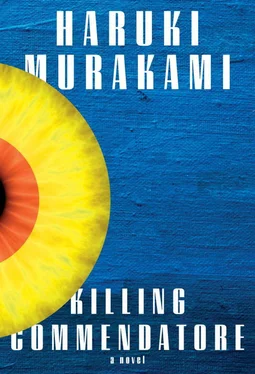“Thank you,” I said.
“Maybe it isn’t my place to say this, but how are you planning to make a living?”
“I haven’t decided,” I admitted. “I’m by myself, so I don’t need much to live on, and I’ve got a bit of savings.”
“Will you still paint?”
“Probably. There isn’t much else I know how to do.”
“I hope it works out.”
“Thanks,” I said once more. And tagged on a question that had just occurred to me. “Is there anything I should make sure to keep in mind?”
“Something you should make sure to keep in mind?”
“In other words—how should I put it—any advice from a pro?”
He thought it over. “You’re the type of guy who takes longer than other people to be convinced of anything. But long term, I think time is on your side.”
Like the title of an old Rolling Stones song.
“One other thing: I think you really have a special talent for portraiture. An intuitive ability to get straight to the heart of the subject. Other people can’t do that. Not using that talent would be a real shame.”
“But right now painting portraits isn’t what I want to do.”
“I get that. But someday that ability will help you again. I hope it works out.”
Hope it works out, I thought. Good if time is on your side.
—
On the first day I visited the house in Odawara, Masahiko Amada—the son of the owner—drove me there in his Volvo. “If you like it, you can move in today,” he said.
We took the Odawara-Atsugi Road almost to the end and, when we exited, headed toward the mountains along a narrow, paved farm road. On either side, there were fields, rows of hothouses for growing vegetables, and the occasional grove of plum trees. We saw hardly any houses, and not a single traffic signal. Finally we drove up a steep, winding slope in low gear for a long time, until we came to the end and arrived at the entrance to the house. There were two stately pillars at the entrance, but no gate. And no wall, either. It seemed the owner had planned to add a gate and wall but thought better of it. Maybe halfway through he’d realized there was no need. On one of the pillars was a magnificent nameplate with AMADA on it, almost like some business sign. The house beyond was a small Western-style cottage with a faded brick chimney sticking out of the flat roof. It was a one-story house, but the roof was unexpectedly high. In my imagination I’d been taking it for granted that a famous painter of Japanese-style paintings would live in an old Japanese-style dwelling.
We parked in a spacious covered driveway by the front door, and when we opened the car doors some screeching black birds—jays, I imagine—flew off from a nearby tree branch into the sky. They seemed none too happy about us intruding on their space. The house was pretty, surrounded by woods with a variety of trees, with only the west side of the house open to a broad view of the valley.
“What do you think? Not much here, is there?”
I stood there, gazing around me. He was right, there wasn’t much there. I was impressed that his father had built a house in such isolated surroundings. He really must have wanted nothing to do with other people.
“Did you grow up here?” I asked.
“No, I’ve never lived here very long. Just came to stay over occasionally. Or visited on summer holidays when we were escaping the heat. I had school, and grew up in our house in Mejiro with my mother. When my father wasn’t working he’d come to Tokyo and live with us. Then come back here and work by himself. I went out on my own, then ten years ago my mother died, and ever since he’s been living here by himself. Like someone who’s forsaken the world.”
A middle-aged woman who lived nearby had been watching the house, and she came over to explain some things I needed to know. How the kitchen operated, how to order more propane and kerosene, where various items were kept, which days the trash was picked up and where to put it. The artist seemed to have led a very simple solitary existence, with very little equipment or appliances, so there wasn’t much for a lecture. If there’s anything else you need to know, just give me a call, the woman said (though I actually never called her, not even once).
“I’m very happy someone will be living here now,” she said. “Empty houses get dilapidated, and they’re unsafe. And when they know no one’s at home, the wild boar and monkeys get into the yard.”
“You do get the occasional wild boar or monkey around here,” Masahiko said.
“Be very careful about the wild boars,” the woman explained. “You see a lot of them in the spring around here when they root for bamboo shoots. Female boars with young are always jumpy, and dangerous. And you need to watch out for hornets, too. There’ve been people who’ve been stung and died. The hornets build nests in the plum groves.”
The central feature of the house was a fairly large living room with an open-hearth fireplace. On the southwest side of the living room was a spacious roofed-in terrace, and on the north side was a square studio. The studio was where the master had done his painting. On the east side of the living room was a compact kitchen with dining area, and a bathroom. Then a comfortable master bedroom and a slightly smaller guest bedroom. There was a writing desk in the guest bedroom. Amada seemed to enjoy reading, as the bookshelves were stuffed with old books. He seemed to have used this room as his study. For an older house, it was fairly neat and clean, and comfortable looking, though strangely enough (or perhaps not so strangely) there was not a single painting hanging on the walls. Every wall was completely bare.
As Masahiko had said, the place had most everything I’d need—furniture, electric appliances, plates and dishes, and bedding. “You don’t need to bring anything,” he’d told me, and he was right. There was plenty of firewood for the fireplace stacked up under the eaves of the shed. There was no TV in the house (Masahiko’s father, I was told, hated TV), though there was a wonderful stereo set in the living room. The speakers were huge Tannoy Autographs, the separate amplifier an original vacuum tube Marantz. And he had an extensive collection of vinyl records. At first glance there seemed to be a lot of boxed sets of opera.
“There’s no CD player here,” Masahiko told me. “He’s the sort of person who hates new devices. He only trusts things from the past. And naturally there’s not a trace of anything to do with the Internet. If you need to use it, the only choice is to use the Internet café in town.”
“I don’t have any real need for the Internet,” I told him.
“If you want to know what’s going on in the world, then the only choice is to listen to the news on the transistor radio on the shelf in the kitchen. Since we’re in the mountains the signal isn’t great, but you can at least pick up the NHK station in Shizuoka. Better than nothing, I suppose.”
“I’m not that interested in what’s going on in the world.”
“That’s fine. Sounds like you and my father would get along fine.”
“Is your father a fan of opera?” I asked.
“Yes, he paints Japanese paintings, but always liked to listen to opera while he painted. He went to the opera house a lot when he was a student in Vienna. Do you listen to opera?”
“A little.”
“I’m not into it at all. Way too long and boring for me. There are a lot of records, so feel free to listen to them as much as you’d like. My father has no need of them anymore and I know he’d be happy if you listened to them.”
“No need of them?”
“His dementia’s getting bad. Right now he doesn’t know the difference between an opera and a frying pan.”
Читать дальше











